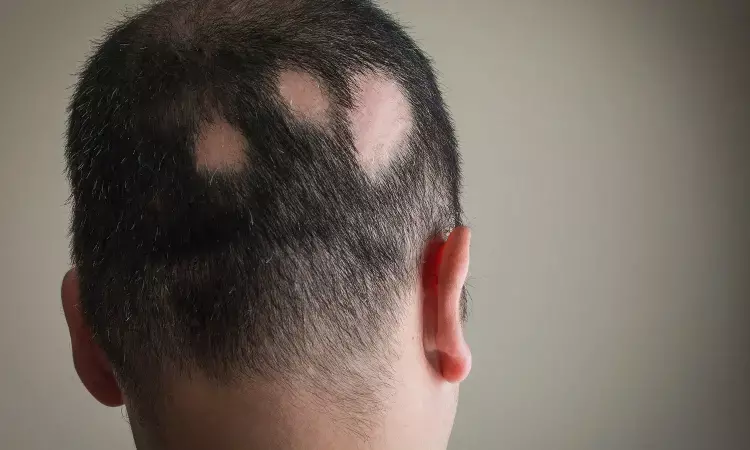- Home
- Medical news & Guidelines
- Anesthesiology
- Cardiology and CTVS
- Critical Care
- Dentistry
- Dermatology
- Diabetes and Endocrinology
- ENT
- Gastroenterology
- Medicine
- Nephrology
- Neurology
- Obstretics-Gynaecology
- Oncology
- Ophthalmology
- Orthopaedics
- Pediatrics-Neonatology
- Psychiatry
- Pulmonology
- Radiology
- Surgery
- Urology
- Laboratory Medicine
- Diet
- Nursing
- Paramedical
- Physiotherapy
- Health news
- Fact Check
- Bone Health Fact Check
- Brain Health Fact Check
- Cancer Related Fact Check
- Child Care Fact Check
- Dental and oral health fact check
- Diabetes and metabolic health fact check
- Diet and Nutrition Fact Check
- Eye and ENT Care Fact Check
- Fitness fact check
- Gut health fact check
- Heart health fact check
- Kidney health fact check
- Medical education fact check
- Men's health fact check
- Respiratory fact check
- Skin and hair care fact check
- Vaccine and Immunization fact check
- Women's health fact check
- AYUSH
- State News
- Andaman and Nicobar Islands
- Andhra Pradesh
- Arunachal Pradesh
- Assam
- Bihar
- Chandigarh
- Chattisgarh
- Dadra and Nagar Haveli
- Daman and Diu
- Delhi
- Goa
- Gujarat
- Haryana
- Himachal Pradesh
- Jammu & Kashmir
- Jharkhand
- Karnataka
- Kerala
- Ladakh
- Lakshadweep
- Madhya Pradesh
- Maharashtra
- Manipur
- Meghalaya
- Mizoram
- Nagaland
- Odisha
- Puducherry
- Punjab
- Rajasthan
- Sikkim
- Tamil Nadu
- Telangana
- Tripura
- Uttar Pradesh
- Uttrakhand
- West Bengal
- Medical Education
- Industry
Study Confirms Baricitinib's Effectiveness for Severe Alopecia Areata and Advocates for Early Trichoscopy

Italy: A recent 24-week study conducted in Italy has yielded promising results regarding the effectiveness and safety of baricitinib for patients with severe alopecia areata (AA).
The research, which focused on real-world applications, endorses the use of this drug for severe forms of this challenging autoimmune condition, including at earlier stages. The researchers also suggest using trichoscopy to detect early responses to the therapy. The findings were published online in the Journal of the European Academy of Dermatology and Venereology.
Alopecia areata is an autoimmune disorder characterized by sudden, patchy hair loss. In severe cases, it can lead to complete loss of scalp and body hair, significantly impacting patients' quality of life. Baricitinib, a Janus kinase (JAK) inhibitor previously used for rheumatoid arthritis, has emerged as a potential treatment for AA. It has been recently approved to treat alopecia areata.
Against the above background, Francesca Pampaloni, Department of Medical and Surgical Sciences, Alma Mater Studiorum University of Bologna, Bologna, Italy, and colleagues sought to reaffirm baracitinib’s effectiveness for patients with alopecia areata.
For this purpose, the researchers conducted a retrospective study across 23 medical centers in Italy, enrolling patients with severe alopecia areata (SALT >50) who had been affected for over six months. Clinical and trichoscopic assessments were carried out at each visit, and the impact on quality of life, anxiety, and depression was evaluated using the Skindex-16 and the Hospital Anxiety and Depression Scale (HADS), respectively.
The study led to the following findings:
- 118 patients were enrolled, with a mean age of 39 years and a mean SALT >95.
- The mean value of the SALT score decreased from an average of 96.6 to 48 after 24 weeks of treatment, and 42.3% of patients achieved a SALT 30, 31.3% a SALT 20, and 20.3% a SALT 10 by Week 24.
- Trichoscopic signs showed fewer yellow dots and black dots significantly earlier than hair regrowth.
- Adverse events during the treatment period (mild laboratory test abnormalities) were reported in 12.7% of patients.
- No drop-outs were registered.
“The preliminary data on the effectiveness and safety of baricitinib in a real-life setting involving over 100 patients are very promising and endorse the use of this drug for severe forms of alopecia areata,” the researchers stated. “Initiating therapy early, particularly in cases with a shorter disease duration, is recommended, along with using trichoscopy to detect responses to treatment sooner than through clinical examination alone.”
Reference:
Piraccini, B. M., Pampaloni, F., Cedirian, S., Quadrelli, F., Bruni, F., Rapparini, L., Caro, G., Acri, M. C., Ala, L., Rossi, A., Pellacani, G., Lacarrubba, F., Micali, G., Vastarella, M., Cantelli, M., Nappa, P., Diluvio, L., Bianchi, L., Gnesotto, L., . . . Starace, M. Real-life effectiveness and safety of baricitinib in patients with severe alopecia areata: A 24-week Italian study. Journal of the European Academy of Dermatology and Venereology. https://doi.org/10.1111/jdv.20312
Dr Kamal Kant Kohli-MBBS, DTCD- a chest specialist with more than 30 years of practice and a flair for writing clinical articles, Dr Kamal Kant Kohli joined Medical Dialogues as a Chief Editor of Medical News. Besides writing articles, as an editor, he proofreads and verifies all the medical content published on Medical Dialogues including those coming from journals, studies,medical conferences,guidelines etc. Email: drkohli@medicaldialogues.in. Contact no. 011-43720751


